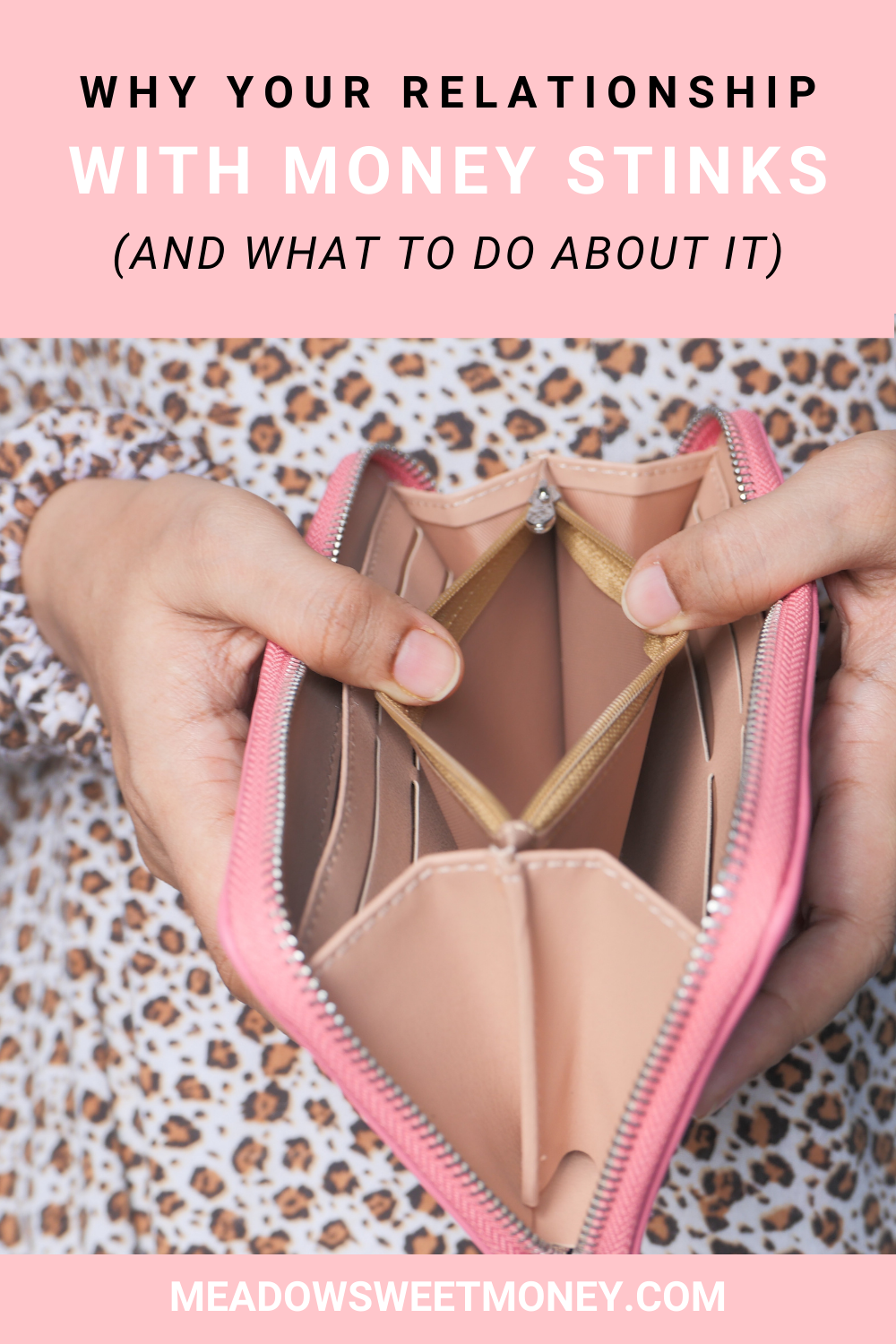Like any long-term relationship, the one you have with your money is an important one. If your relationship is not where you want it to be, read on to discover why – and what you can do to fix it.
You’re Afraid of Money
Before I decided to tackle debt, I was afraid to even look at my bank accounts. Usually, I only checked to 1) see how much I got paid, and 2) see how close I was to overdrafting. Yikes. Talking about money made me feel queasy, and my lack of confidence around finances put me at some major disadvantages. This fear got me talked into paying $35 a month for disability insurance I absolutely did not need, and miss out on crucial retirement contributions.
Changing my definition of money was the key to making our relationship better and healthier. Vicki Robin’s definition from her book, “Your Money or Your Life”, has long stuck with me: money is what you trade for your life energy. The first time I heard it while listening to her audiobook on my drive to work, I had to pause and wait to pull over so I could relisten. I was gobsmacked.
Seeing money as what I received in return for spending my time, talent, and energy (valuable assets I can never get back) was life-changing, to say the least. I was no longer buying lunch out…I was trading 1 hour of my life energy for a sandwich. I was no longer just paying interest on a credit card. I was spending my future life energy.
You’re Hanging on to Toxic Money Mindsets
Do you know how they say kids are sponges? Well, guess what?! You were a kid once too. I remember hearing certain things about money that I carried into adulthood – and they didn’t serve me at all. For example, a common phrase I’d hear from grownups around me was, “Money is like sand in your hand. As soon as you get some, it’s gone.” And, yeah, my spending habits reflected that money mindset I had unwittingly soaked up. Sadly, I wasn’t even aware I believed these things until I had to face them head-on.
Your money mindsets come from all sorts of places – your parents and family members, your culture, your religious beliefs, and your personal experiences. It is likely that you don’t even know what your money mindsets are. Confronting your beliefs around money and finances is a process that takes time and curiosity. I began to ask myself questions about what I actually believed about money and then getting curious about the origins of that belief.
For example, I’d ask myself, “What do I believe about investing?” and my mind would say, “investing is like gambling.” Then I’d question that – “Why do I believe investing is like gambling? Where did I learn that?” As I’d question my thoughts and beliefs, slowly I’d begin to identify that most of my ideas about money had very little to do with facts or first-hand experience.
You Don’t Know Your Spending Triggers
Raise your hand if you make bad spending decisions when you’re hungry. Hear that? That’s the sound of both of my hands shooting straight up because that’s totally me. But I wasn’t aware of that for a long time.
We all have triggers that make us spend money (often, on things that are regrettable or forgettable). When I realized that I spent money like crazy when I was on the fast track to becoming a hangry monster, I found ways to put a lock on that specific trigger; like making sure I have a bottle of water and a snack before venturing out to do errands.
You Haven’t Figured Out What You Actually Value
What makes you genuinely happy and joyful?
Many would say spending time with family and friends.
But what about that friend who invites you to happy hour, only to vent about their boyfriend for two hours? Or your cousin that asks you to be part of their wedding…on the other side of the country?
Getting super specific about what actually matters to me slammed the breaks on a lot of my mindless spending. And you know what? I don’t value spending money at happy hour to listen to someone complain. I don’t value spending both my money and vacation time out of obligation. Knowing with great clarity what I value and brings me joy has been a game-changer.
You Have No Idea Where Your Money Goes
Picture this: your significant other gets up from the couch, and as they are walking to the door you ask, “Where are you going?” and they reply, “I dunno. Somewhere.” And when you ask, “Are you coming back?” they said, “Not sure.” Feels kinda shady and yucky, right?
Have you ever opened your wallet or bank account and asked, where did all my money go? Same. Not a sign of a good money relationship.
Tracking your spending and keeping a budget is like a relationship with excellent communication. My spending tracker is like the coach on the side of the field, ready to direct my budget to the right plays.
Ready to Heal Your Money Relationship?
My relationship with money was on the skids for years and led me to be in a lot of debt. Having more or less income, saving or not saving…it didn’t matter until I healed my money relationship.
I’m glad I focused on repairing it – which is why I was able to become debt-free, learn to feel confident in saving and investing, and talk about money openly with both friends and strangers.
I believe that anyone can heal and improve their financial life.


